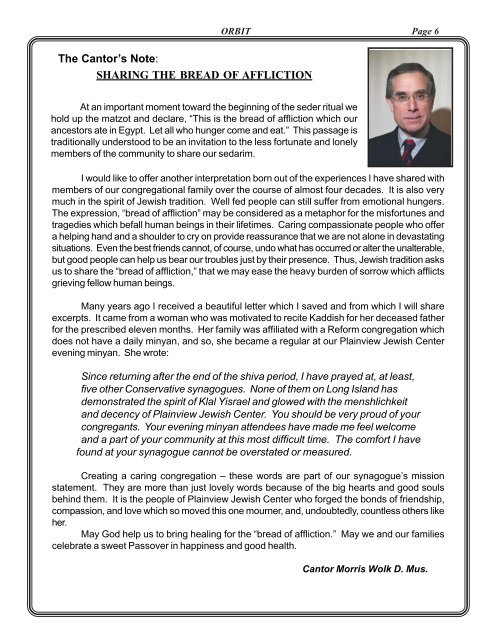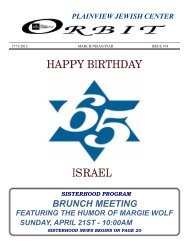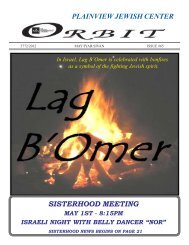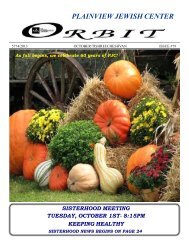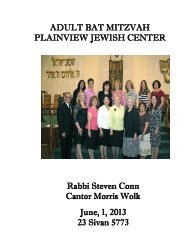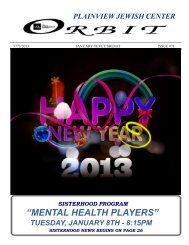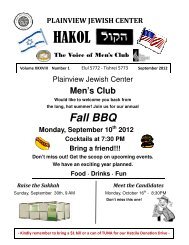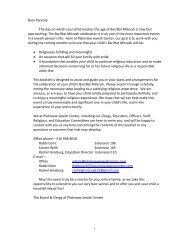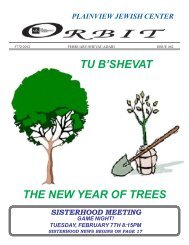Orbit April 2012 - Plainview Jewish Center
Orbit April 2012 - Plainview Jewish Center
Orbit April 2012 - Plainview Jewish Center
Create successful ePaper yourself
Turn your PDF publications into a flip-book with our unique Google optimized e-Paper software.
ORBIT<br />
Page 6<br />
The Cantor’s Note:<br />
SHARING THE BREAD OF AFFLICTION<br />
At an important moment toward the beginning of the seder ritual we<br />
hold up the matzot and declare, “This is the bread of affliction which our<br />
ancestors ate in Egypt. Let all who hunger come and eat.” This passage is<br />
traditionally understood to be an invitation to the less fortunate and lonely<br />
members of the community to share our sedarim.<br />
I would like to offer another interpretation born out of the experiences I have shared with<br />
members of our congregational family over the course of almost four decades. It is also very<br />
much in the spirit of <strong>Jewish</strong> tradition. Well fed people can still suffer from emotional hungers.<br />
The expression, “bread of affliction” may be considered as a metaphor for the misfortunes and<br />
tragedies which befall human beings in their lifetimes. Caring compassionate people who offer<br />
a helping hand and a shoulder to cry on provide reassurance that we are not alone in devastating<br />
situations. Even the best friends cannot, of course, undo what has occurred or alter the unalterable,<br />
but good people can help us bear our troubles just by their presence. Thus, <strong>Jewish</strong> tradition asks<br />
us to share the “bread of affliction,” that we may ease the heavy burden of sorrow which afflicts<br />
grieving fellow human beings.<br />
Many years ago I received a beautiful letter which I saved and from which I will share<br />
excerpts. It came from a woman who was motivated to recite Kaddish for her deceased father<br />
for the prescribed eleven months. Her family was affiliated with a Reform congregation which<br />
does not have a daily minyan, and so, she became a regular at our <strong>Plainview</strong> <strong>Jewish</strong> <strong>Center</strong><br />
evening minyan. She wrote:<br />
Since returning after the end of the shiva period, I have prayed at, at least,<br />
five other Conservative synagogues. None of them on Long Island has<br />
demonstrated the spirit of Klal Yisrael and glowed with the menshlichkeit<br />
and decency of <strong>Plainview</strong> <strong>Jewish</strong> <strong>Center</strong>. You should be very proud of your<br />
congregants. Your evening minyan attendees have made me feel welcome<br />
and a part of your community at this most difficult time. The comfort I have<br />
found at your synagogue cannot be overstated or measured.<br />
Creating a caring congregation – these words are part of our synagogue’s mission<br />
statement. They are more than just lovely words because of the big hearts and good souls<br />
behind them. It is the people of <strong>Plainview</strong> <strong>Jewish</strong> <strong>Center</strong> who forged the bonds of friendship,<br />
compassion, and love which so moved this one mourner, and, undoubtedly, countless others like<br />
her.<br />
May God help us to bring healing for the “bread of affliction.” May we and our families<br />
celebrate a sweet Passover in happiness and good health.<br />
Cantor Morris Wolk D. Mus.


